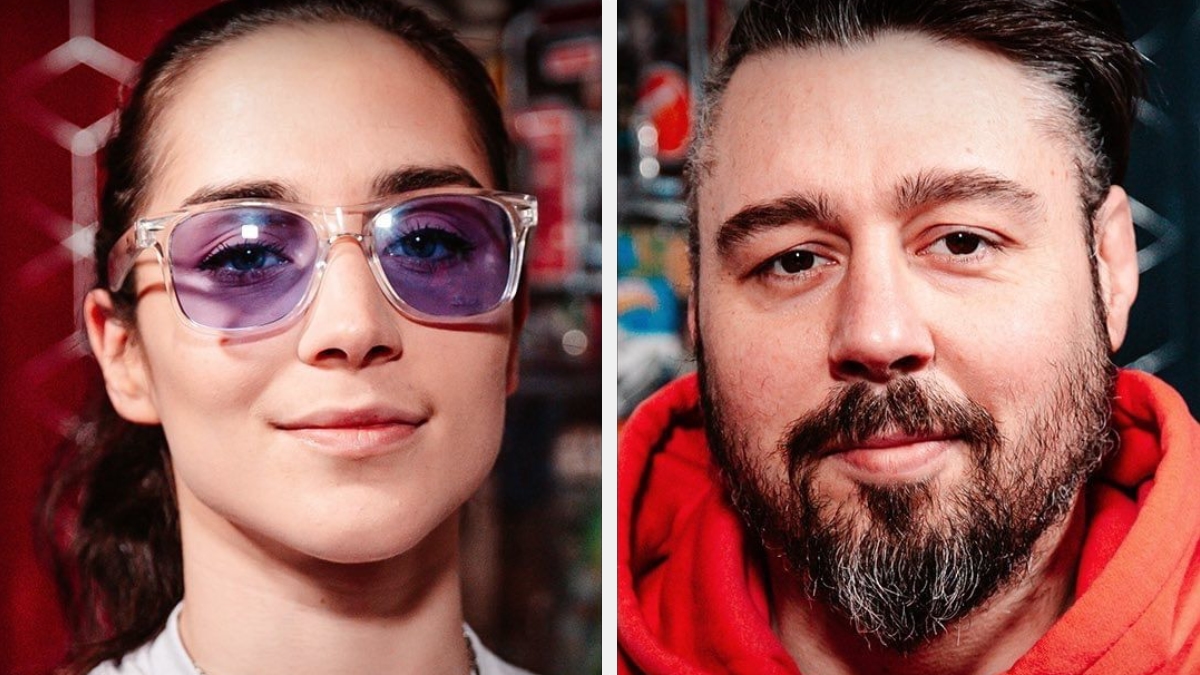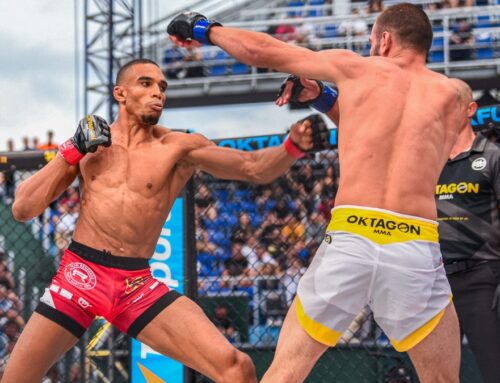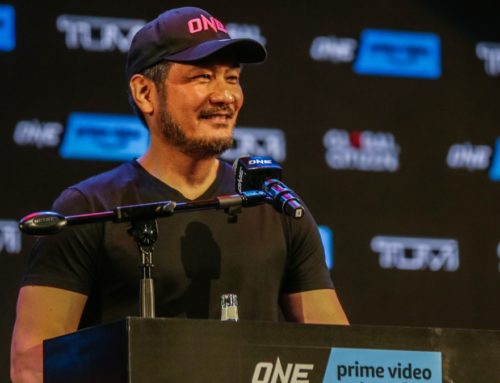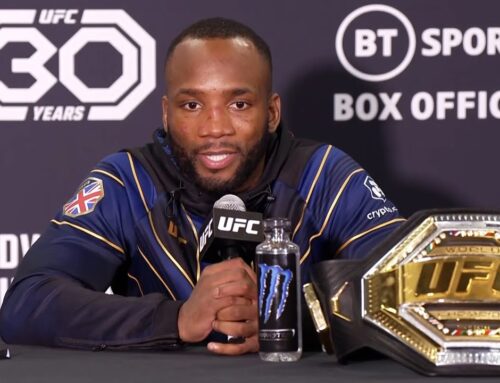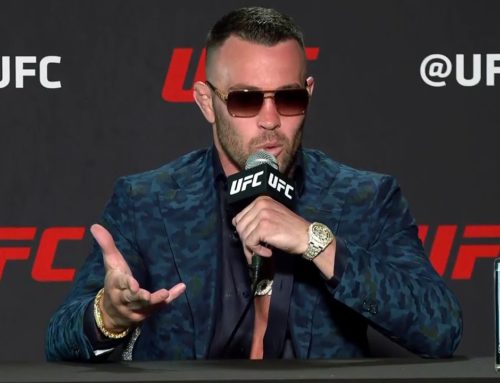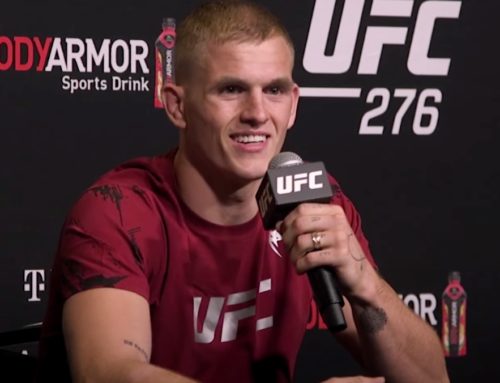The opening bout of UFC 286 will see husband and wife team of Veronica and Dan Hardy make the walk to the Octagon for their first assignment together as a married couple. Simon Head caught up with them both during fight week in London to get an inside look on life in a married fighter-coach partnership.
After an MMA career spanning eight years and a UFC title challenge, plus a successful career as one of the most respected fight analysts in the sport, there isn’t too much Dan hasn’t seen in MMA. He’s cornered plenty of his teammates over the years, too. But on March 18 at The O2 Arena he’ll corner his wife, Veronica, as she makes her return to the Octagon. For Veronica, it’s a fresh start as she looks to kickstart her career following a three-year layoff, and she’ll do it with her husband in her corner.
How does the dynamic work when you’re preparing for a fight? How do you separate Dan as a coach and a husband? Or is it all just a constant thing?
Veronica: I feel like we both just love the sport so much, that it blends into one. Obviously, there’ll be periods of times during the day, like training time where I have to make sure that I’m prepared to train and I have the right equipment. But other than that, I personally love it, because I get to share something that I love with somebody that I love.
It gives us something to talk about, to obsess about, and to share and it makes it so much more special. It doesn’t feel like a lonely sport anymore. It feels like you’re creating something that’s awesome. You can create different ways to approach the fight, or go over different tactics, and just all of that blended in one.
It’s like having a really good training partner with you all the time that you get to try stuff on. Brother or sister teams like the Shevchenkos, they can train together whenever they want. And I have Dan who I can, if I think of something, I can go, “What about this?” and he’ll be able to tell me about it or show me a fight where something like that has happened. And to have somebody who’s sort of like an encyclopaedia of MMA, available at whatever time, is something pretty unique.
What’s it like when Dan pulls up your footage and starts doing his analyst thing, breaking down your technique, saying, “Right, this is something that we need to tweak. This is something that we need to work on.”
Veronica: That’s that’s kind of great, because you can’t run away from it, you can’t hide from it. It’s something I wish I would have done sooner, but I didn’t really know how to approach it. You get to see that, “Hey, man, maybe it’s not as bad as I initially thought. It’s just you didn’t make the right decisions here,” and you can see how to fix things and the problems.
Instead of things becoming bigger and more overwhelming, they become smaller because you can see where the mistakes have been and how how to approach them differently. It wasn’t, “Oh, you have to go train for three more years and do something else,” you know? It’s like, “Oh, in this position, this is the decision that you should have made or this is how you should have approached it.” So it’s actually made it so much smoother.
Dan, sometimes a corner has to intervene during a fight. When you have that professional distance it’s maybe a slightly easier decision to make. How different is it for you cornering Veronica, compared to cornering someone like (longtime teammate) Jimmy Wallhead, for example?
Dan: It’s probably a better question to answer after the event, but to be honest, there’s never a time when I’m cornering when I’ve got just a professional relationship with them, not even my teammates, you know what I mean? If they’re in a situation where I felt like they needed looking after, I will look after them, just as I would V. And I’m not gonna be any more sensitive with V than I wouldn’t be with my teammates, because I have to give her the benefit of doubt, as a competitor, to do her job. And the thing is, I’m more confident in cornering her than I have been anybody else. Because I know that she’s done the work. I’ve been with her 24 hours a day during training camp.
Anytime I can see that there’s any kind of anxiety, we can talk about it. And I just feel confident that she’s in a really good place. Any technical questions, we go over them straight away after the training sessions if it was a good one. If it was a bad one, we talked about it, and it’s always cards on the table. Not every training session is a good one, not every training session is a bad one.
V’s had an amazing training camp, she has been the best student I’ve ever trained. She listens, she learns so fast, she gets frustrated with herself when she doesn’t make something work immediately. And you know, I have to kind of sometimes make sure she’s got a bit of forgiveness for herself, because she puts a lot of pressure on herself. And she is incredibly talented.
The other thing is, there’s no agenda in this relationship. V’s traveled around the world and she’s worked with a jiu-jitsu coach and a kickboxing coach. And they might both want to do their thing in the fight, so they’re kind of falling in their own directions. And everyone wants their piece of the pie. I don’t want any piece of pie. I want her to go and smash it and be a world champion. I know that she can do that.
We’re looking at the division now at flyweight, and we’re thinking – and I’m telling you this as an analyst as well as a coach – we can come out of the darkness and completely take this weight class. She is capable of beating everybody in the weight class on this day, right now. And that gives me some confidence. So I just let her do the job. I have to make sure that everything that can be done in the lead-up to the cage door closing is done.
With Dan saying you’re in a great spot to take 125 by storm, what’s the what’s the hope and the plan for 2023?
Veronica: Honestly, I haven’t really looked at that, just because I’ve been out for three years. So you kind of just want to take what you have right in front of you and realize that it’s not only the opponent you have to face, but you also have to face the timeout that you have been in, and that’s quite a big challenge on its own.
So, for this one, I am just looking at this fight and see how I end up after. I’ll see what I need to do, speak to my other coaches like Paul Reed, who’s working with my nutrition and my conditioning, and see what he wants me to do in order to be a better fit for this weight class. Because I don’t only want to go from fight to fight, I also want to improve from fight to fight, and be a better version of myself and a better martial artist each time.

